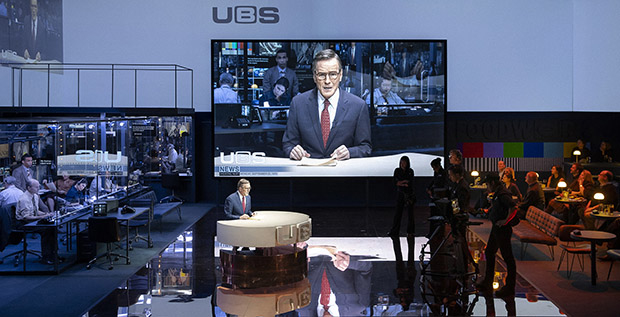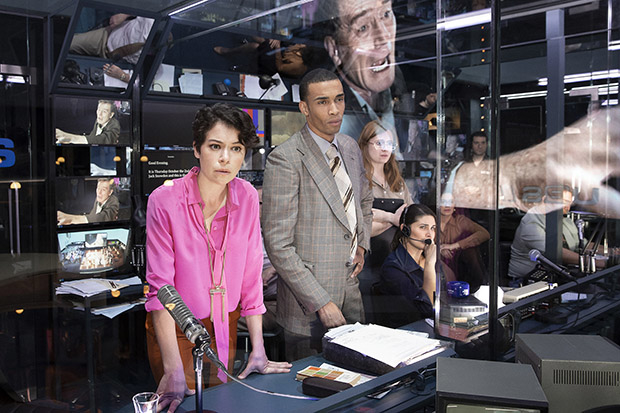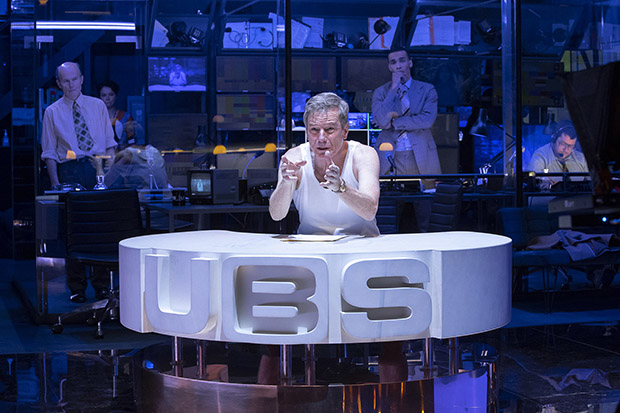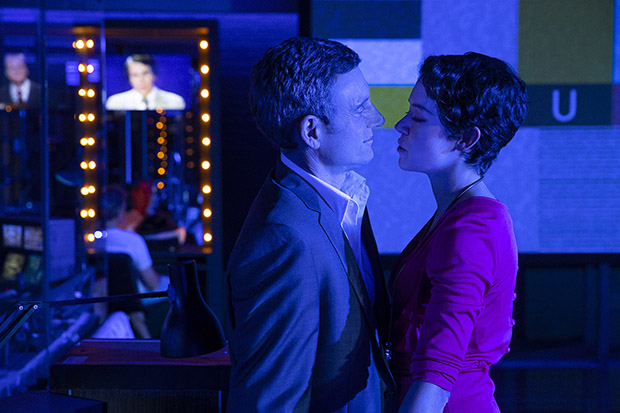In Network, Bryan Cranston Plays a Mad-as-Hell News Anchor

(© Jan Versweyveld)
He's mad as hell, and chances are you are too. With the rancor in American society at a fever pitch, never has there seemed a better time to revisit Network, the story of an anchorman whose televised rants channel the rage of a nation. This new stage adaption by Lee Hall (Billy Elliot) comes 42 years after the Paddy Chayefsky-Sidney Lumet film, with much of the original story and dialogue intact. It's remarkable to see how Chayefsky seems to predict the rise of reality TV, the mutation of news into entertainment, and the amorality that comes with an obsessive focus on the bottom line. Network is a story for our time, which is why it is disappointing that Hall and director Ivo van Hove only make the half-choice to set it here and now.
To be sure, the script tells us that the first scene takes place on September 19, 1975, the day after the recapture of Patty Hearst. That's the top story as reported by Howard Beale (Bryan Cranston), a hard-nosed news anchor of the Cronkite generation. The UBS network on which Beale appears has decided to retire him because of poor viewership, leading Beale to announce that he will shoot himself on live TV. "It ought to get a hell of a rating," he sardonically remarks.
But when Beale's televised meltdown draws mountains of free publicity and seismic ratings, programming executive Diana Christensen (Tatiana Maslany) sees an opportunity to capture the market by transforming the news into something angrier and splashier. It's a decision that makes shareholders and executives like Frank Hackett (Joshua Boone) happy, but news director Max Schumacher (Tony Goldwyn) is uncomfortable with how his old friend's mental deterioration has become must-see TV. And what will corporate think when Beale starts railing against a planned foreign acquisition of UBS's parent company, imploring Americans to take their country back?

(© Jan Versweyveld)
Network impressively augurs the struggle between so-called "globalists" and "nationalists," a hot war in 2018. Van Hove recognizes this relevance, which perhaps explains the play's contemporary design: Jan Versveyveld's sleek modern set looks like a cable news studio from today, while his flashing, jitters-inducing lighting is augmented by Eric Sleichim's pulse-quickening original music. Before every broadcast, the studio staff resembles a submarine crew preparing to dive. Tal Yarden's video design appears on flat screens strategically placed around the stage. Much of that is captured live using modern video equipment, but retro commercials also run on a loop on other screens, the design's one major concession to the 1970s. An D'Huys costumes the actors mostly in passing-for-contemporary power suits, with smatterings of borrowed '70s flair, allowing them to blend in with the "smart-casual" clothing worn by the onstage audience members.
Stage left is occupied by Foodwork, a restaurant that invites guests to view the play up-close while enjoying a four-course meal (for the princely sum of $399, or $299 on Wednesday matinees) — presently, there is no cushier vantage point from which to contemplate the revolt against global capitalism.

(© Jan Versweyveld)
The lingering question of the evening is if Hall and Van Hove could have updated the script to 2018 without the plot completely unravelling. The 6:30 news is not the national family meeting it once was. Rather than boldly leaping into today's fragmented media landscape, Hall's adaptation maintains the original dates while also preserving much of what didn't work in Chayefsky's screenplay: A wrath-of-God monologue from parent-company CEO Arthur Jensen (an ethereal Nick Wyman) allegedly delivers the gospel of profit to the prophet Beale. But if you don't buy that contrived conversion in the film, you're not going to buy it here. Beale delivers a later monologue from the audience extolling the virtues of the network of global capital and describing us as "bees in the hive." At the performance I attended, Cranston turned to his neighbor and ad-libbed, "That make sense?" Her befuddled expression seemed to silently speak for all of us. Network relies on such operatic rants, not all of which are created equal.
Also unequal is the skill with which this cast delivers them. Cranston is magnificently craggy as Beale, playing to the cameras and live audience with the same level of mastery. Unfortunately, Boone is noticeably affected as Hackett, while Maslany (playing a role originated by a frenzied Faye Dunaway) is practically catatonic as Diana. The ancillary nature of her affair with Max is made even less interesting by the total lack of chemistry between Goldwyn and Maslany. When the youthful Goldwyn says, "Death is suddenly a perceptible thing to me," it's hard not to wonder why, for this May-December romance, the producers have cast a September.

(© Jan Versweyveld)
More than the writing or acting, Tal Yarden's relentless video design exposes the awful tyranny at the heart of Network. As we attempt to watch the uneven performances downstage, our eyes are involuntarily drawn to the action on the huge screen upstage. How can real humans possibly compete with this glowing electric God? This isn't just a problem from the high age of the tube: Take a look at your fellow audience members, buried in their phones until the last possible moment it is socially acceptable — and sometimes long after it is unacceptable. You may be mad as hell, but it really doesn't matter when your eyeballs are glued to the screen.










